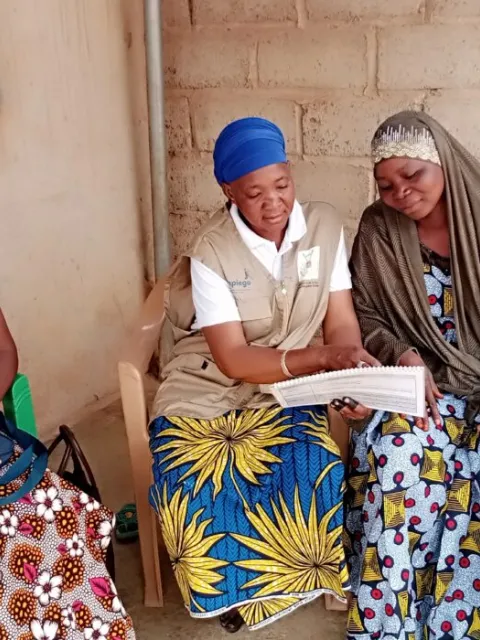How gender inequities and power dynamics shape the global cancer landscape
A new report by the Lancet Commission on Women, Power and Cancer outlines actionable recommendations to address the impact of gender and power dynamics on access to cancer prevention and care for women.

HIGHLIGHTS
- The Lancet Commission on Women, Power and Cancer report reveals that gender inequality is a significant barrier to cancer prevention and care for women.
- The report highlights unconscious gender biases in healthcare systems and calls for a transformative feminist approach, offering actionable recommendations for policymakers and healthcare systems.
- Financial challenges specific to women, such as transportation and childcare costs, are emphasised, alongside the need for legal frameworks to address gender and cancer inequities.
A landmark report, launched this week at the Graduate Institute Geneva by the The Lancet Commission on Women, Power and Cancer, highlights how gender inequality – due to the role of women in society and cultural norms, which often render them structurally marginalised – is a significant barrier to cancer prevention and care for women.
In 2020, there were an estimated 4.43 million deaths among women due to cancer. According to the report, some 1.5 million of these deaths that occured among women aged 30-70 could have been averted through primary prevention measures, including the elimination of exposures to key risk factors or via early detection and diagnosis, and the lives of a further 800,000 women aged 30-70 would have been prevented if all women had access to optimal cancer care.
The report also notes that two-thirds of the estimated 1.2 million new cancer cases diagnosed in 2020 among young adults aged 20-39 affect women, and that "more women will die from a cancer that is specific to women [e.g. breast, cervical] than men will die of a cancer that is specific to men [e.g. prostate], if breast cancer is considered a female-specific cancer." (Approximately 0.5–1% of breast cancers occur in men.)
“The impact of a patriarchal society on women’s experiences of cancer has gone largely unrecognised. Our Commission highlights that gender inequalities significantly impact women’s experiences with cancer. To address this, we need cancer to be seen as a priority issue in women’s health, and call for the immediate introduction of a feminist approach to cancer. Breastfeeding, for instance, can help reduce the risks of developing breast cancer, but even if a woman would like to and can breastfeed, there needs to be legislation and an environment for her to be able to do so, for example at the workplace.”
– Dr Ophira Ginsburg, Senior Advisor for Clinical Research at the National Cancer Institute’s Center for Global Health and co-Chair of the Commission.
Unconscious gender biases and discrimination within healthcare systems exacerbate these inequalities, affecting both patient care and women's roles within the cancer workforce. Women are predominantly unpaid caregivers and are underrepresented in leadership roles across research and policy organisations, with subsequent impact on their exposure to risk factors and access to health information and essential services.
"Power is at the centre of these inequities," says Dr Somesh Kumar, Senior Director, New Initiatives and Innovations, Jhpiego. As an example, he cites the lack of agency women experience over decisions about their health highlighting that women in India often do not have ownership and usage of mobile phones.
The Commission also emphasised the particular financial challenges associated with cancer that particularly women face, in addition to the medical costs that would be similar regardless of gender: transportation, accommodation, childcare and household help while undergoing treatment and care; medical and supportive care aids such as breast prosthesis or wigs and social welfare support.
Limited access to education and professional paths for young women compared to men reduces their ability to earn more, in more stable professions – sometimes prevents them from working. this plays into the disparities in access to health information, status and salary betwee men and women.
The report notes that "the unequal status and earning power between men and women might translate into unequal purchasing power and decision making within households regarding access to diagnostic investigations and cancer care for women." Dr Kumar gave the example of a woman who goes to get screened and when a tumour is found in her breast, the husband says: "Why did you go and get screened, now we have a mess on our hands."
“Women experience more financial distress [as a result of cancer] than men. Why is that? The cost of cancer is not only about the medication and hospitalisation, there is also the social aspect. There are also the non-medical costs such as childcare related to the traditional roles assigned to women. So when they get cancer, who is going to take care of the family? If you think about it, men get cancer, the wife goes on taking care of the family and doing all the necessary tasks. But when the woman get cancer, she has to find someone to fill that role. Also, women have less access to resources, are more likely to have income loss, and most of the time - especially in low- and middle-income countries - they are more likely to be in the informal workforce where they earn less and have less protection if they are ill.”
– Prof. Jennifer Moodley, Director Cancer Research Initiative, University of Cape Town
Compiled by an exemplary multidisciplinary and global team of experts, including Dr Miriam Mutebi, member of UICC’s Board of Directors, The Lancet Commission's report calls for a transformative feminist approach in cancer care. It provides key actionable recommendations aimed at policymakers, governments, civil society and health and social care systems.
Among these recommendations are the need for routine data collection on sex and gender in cancer statistics, gender-transformative strategies to increase access to early detection, more public financing for preventative care, better working conditions for frontline healthcare staff, family support, and equitable distribution of research resources and leadership opportunities for women.
The Lancet Commission aims for its findings and priority actions to enable healthcare systems become more inclusive and responsive to the unique needs of women.
Read the report by The Lancet Commission on Women, Power and Cancer
The report was launched at a hybrid panel event at the Graduate Institute Geneva in Switzerland last Thursday 27 September.
UICC is a partner in the Commission and previously highlighted the work of The Lancet Commission on Women, Power and Cancer in an article on gender norms and discrimination in cancer care published for International Women’s Day on 8 March.
The transformative potential of law for gender and cancer
A Comment on the potential of law to produce change, published alongside the Commission and authored by staff from the McCabe Centre for Law and Cancer, one of UICC’s sister organisations, explores the transformative potential of law in affecting gender and cancer outcomes. The Comment emphasises that law, distinct from policy, serves as an enforceable instrument that shapes societal norms and behaviours, extending from international to national levels.
While laws can reinforce patriarchal systems that marginalise women, such as requiring spousal consent for health examinations, they also have the power to bring transformative change. Laws can target risk factors or health system responses directly, while also influencing broader gender norms contributing to cancer inequities.
Such legal frameworks may be particularly important for women in low- and middle-income countries, who are disproportionately affected by cancer due to a confluence of gender inequality, environmental factors and social inequities.
These frameworks, however, may be equally relevant in high-income countries, where outcomes in cervical cancer prevention and treatment are often associated with race, ethnicity and socioeconomic position. The Commission underscores that the design and implementation of law must account for multiple overlapping social factors.
The Comment emphasises that the findings of the report by the Lancet Commission on Women, Power and Cancer demonstrate that law is not a panacea but a vital component in a multifaceted approach to addressing the complexities of gender and cancer, illustrating a growing consensus on the necessity for integrated, multidisciplinary strategies to advance cancer prevention and treatment while addressing social determinants and inequities.
Last update
Monday 17 June 2024
